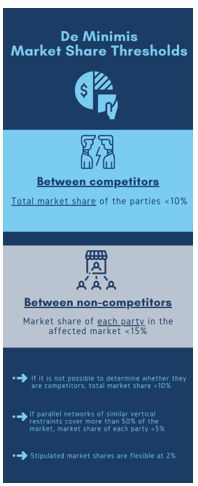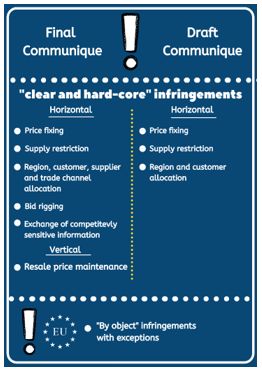The Communiqué on Agreements, Concerted Practices, and Association of Undertakings' Decisions that Do Not Significantly Restrict Competition ("De Minimis Communiqué") numbered 2021/3 entered into force after being published in the Official Gazette dated March 16th, 2021
Background of the development
The "de minimis rule", which allows the competition authority to refrain from investigating agreements that do not significantly restrict competition, has been introduced in the Turkish competition law regime for the first time with the amendments to the Competition Act No. 4054 ("Act") on June 24th, 2020.
The paragraph added to article 41 of the Act states that "the Competition Board ("Board") may decide not to initiate an investigation concerning agreements and concerted practices as well as decisions and actions of associations of undertakings that do not significantly restrict competition in the market, except clear and hard-core infringements such as price-fixing between competitors, region and customer allocation, and supply restriction." Besides, the Act stipulates that rules and procedures concerning the application of this paragraph shall be established with a communiqué issued by the Board.
Accordingly, the Turkish Competition Authority ("TCA") has been working on secondary legislation, the draft version of which was published on its website on October 23, 2020, for the comments and recommendations from the public ("Draft Communiqué").
The final version of this Communiqué was enacted on March 16, 2021, and entered into force upon publication in the Official Gazette.

The content of De Minimis Communiqué
According to the De Minimis Communiqué, the following agreements, with the exception of clear and hard-core infringements are not deemed significant restrictions and thus, may benefit from the de minimis rule:
- Agreements between competitors where the combined market share of the parties does not exceed 10% in any of the markets affected by the agreement; and
- Agreements between non-competitors where the market share of each undertaking does not exceed 15% in any of the markets affected by the agreement
If it is not possible to determine whether the agreement is executed between competitors, the parties' combined market share should not exceed 10% in any of the markets affected by the agreement for the application of the de minimis rule.
If parallel networks consisted of similar vertical restraints cover more than 50% of the relevant market, the parties' market shares each should not exceed 5% to benefit from the de minimis rule.
Besides, even if the parties' market shares exceed the thresholds specified under the De Minimis Communiqué for two consecutive calendar years of the agreement period, the parties may still benefit from the "de minimis" exception as long as these thresholds are not exceeded by more than two percent.
On the other hand, the De Minimis Communiqué states that "the Board might not initiate an investigation" against the agreements, practices, and decisions, where the parties do not exceed the respective thresholds. In other words, the Board retains the ability to initiate an investigation, even if the parties fulfill the conditions required to qualify for de minimis.

Differences between the draft version and the final De Minimis Communiqué
As mentioned above, clear and hard-core infringements cannot benefit from the de minimis rule. The De Minimis Communiqué provides a list of clear and hard-core infringements. In the draft version of the Communiqué, clear and hard-core infringements were determined as price-fixing between competitors, territory or customer sharing, and restriction of supply.
The final De Minimis Communiqué expands the scope of such infringements and includes resale price determination between non-competitors, bid-rigging, and sharing competitively sensitive information as well.
Moreover, the Draft Communiqué expressly provided that "the Board may launch an investigation when it deems necessary, even if the market share thresholds specified above are not exceeded". This provision has been removed from the final text. However, as mentioned above, the final wording of the Communiqué indicates that the Board might initiate an investigation, even if the thresholds are not exceeded.
Differences between "de minimis" in Turkey and the EU
De minimis practice has its roots in European competition law. Although the rules introduced by the De Minimis Communiqué are mostly based on European legislation, there are differences in Turkish practice. By way of example, the European practice provides a safe harbor for agreements that meet de minimis conditions, while TCA retains the option to launch an investigation if it deems necessary. Another difference between Europe and Turkey is the determination of hard-core infringements that cannot benefit from the de minimis rule. The De Minimis Communiqué in Turkey defines the hardcore infringements and does not include any exception, while the EU legislation provides that the "by object" infringements cannot benefit from the de minimis rule and entertains a separate guideline for the exceptions to the "by object" infringements.
The content of this article is intended to provide a general guide to the subject matter. Specialist advice should be sought about your specific circumstances.



